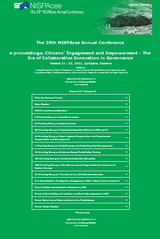X. Working Group on Non-Governmental Organizations in Central and Eastern Europe
WG Programme Coordinators:
Michael Brintnall, ASPA Council, US
Gyorgy Hajnal, Corvinus University of Budapest, Hungary
WG Assistant Coordinator:
Reka Mathe, National University of Public Service, Budapest, Hungary
The launch of a new Working Group on Non-governmental Organisations recognises the growing significance of NGO’s in governance and in shaping and meeting the needs of citizens. Our interests are broad – to understand the role of NGO’s in governance in the CEE region, to analyse he performance and consequences of this sector, and to explore multi-sector strategies for meeting the public interest. Our definition of NGO’s is a broad one, to include informal organisations, cooperatives, non-profits, civil society organisations, and so forth. Our interests lie particularly with those NGO’s whose mission is in the public interest and pertains to governance, social services, public policy, citizen participation, and/or humanitarian concerns. And we intend to explore the role that NGO’s play – independently and in multi-sector collaboration with government institutions – in defining and achieving the public good.
There are many questions to explore about the work of NGO’s in the central and eastern European region. How are these organisations structured and administered? What roles do they play – for example, in service delivery, public participation, policy analysis and social equity? Where do they find resources? What does their non-profit status mean within the context of state regulations? How do they link with other important institutions – economic, religious, political and labour? What resources and capabilities exist in this sector from country to country? How are they administered and evaluated? Last but not least, what role are schools of public administration and management playing in training leaders for the organisations of this sector?
We welcome scholars and professionals with interest in NGO’s and in multi-sector governance processes to join us, and we invite papers with a theoretical, empirical and/or analytical focus on all aspects of these questions. As a body of work develops within our working group, we hope, as a community, to further refine and focus our agenda.
To help provide some structure to these initial efforts, for 2016 we have identified four main questions to help focus the first rounds of papers. These are:
- What is the role of NGO’s in governance at the national and local level in CEE countries, and how is this shaped by public attitudes, government policy, legislation, and financial support? How do actual (latent) roles compare with the stated ones, and with those usually found internationally?
- What are examples of existing multi-sector models of governance in the region, in which NGOs and government are seeking to work together?
- What are the techniques for the measurement and assessment of NGOs and multi-sector initiatives, performance, in general and in specific policy arenas?
- What is the current state of teaching and curriculum development about NGO’s and multi-sector governance in schools of public administration, policy and management in the region, and what contributions can there be to improving curriculum and teaching?
We are also mindful of the important connections between these topics and the conference theme: Spreading Standards, Building Capacities: European Administrative Space in Progress. We especially welcome work that addresses the place of NGO’s and multi-sector governance in the European administrative space, including attention to administrative capacities, legal oversight and standards for NGO performance, improved NGO management, and the potential for an active NGO role in governance to address issues of equity and human rights in the European Administrative Space.




 Price:
Price: 









